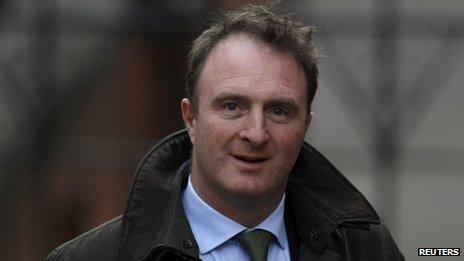James Harding named as director of BBC News
- Published

The former editor of the Times, James Harding is the BBC's new director of news and current affairs, director general Tony Hall has confirmed.
Mr Harding resigned from the paper in December, saying it had been made clear that publishers News International wanted a new editor.
He became editor of The Times in 2007 at the age of 38.
"James has a very impressive track record as a journalist, editor and leader," Lord Hall said in a statement.
The ex-Times journalist is also the paper's former business editor and was also Washington bureau chief of the Financial Times.
Mr Harding said he was "honoured" to be a part of the BBC's newsroom that is "trusted for its accuracy, respected for its fairness and admired for the courage of its reporting". He will receive a salary of £340,000.
Lord Hall said he was "delighted" to make the announcement and that Mr Harding would take up his post on 12 August, having spent time with news teams over the next six weeks to familiarise himself with them.
"High quality journalism is at the heart of our organisation," Lord Hall said.
"I believe James will give News a renewed sense of purpose as it moves on from what has been an undeniably difficult chapter."
The BBC boss added that Mr Harding would bring "the benefit of his external perspective and experience to the senior executive team and wider organisation".
Mr Harding began his career at The Financial Times in 1994 where he opened a bureau in Shanghai.
He was the FT's media editor for three years and went on to become Washington bureau chief in 2002.
Mr Harding joined The Times in 2006 as Business Editor before being appointed editor of the paper in 2007.
During the Leveson inquiry examining the culture, practice and ethics of the press, he publicly apologised for a Times reporter who hacked into Lancashire police detective Richard Horton's email account to write a story.
When Mr Harding resigned in 2012, the chairman and chief executive of News Corp Rupert Murdoch called him "a distinguished editor" who led the paper through "difficult times".
His appointment at the BBC comes after the former head of news, Helen Boaden, moved to a new role as director of BBC Radio.
Ms Boaden had to step aside for a period from November last year, along with her deputy Steve Mitchell, in the wake of the Savile investigations.
She returned to her job just before Christmas, after the Pollard Review criticised BBC management but found no evidence of a cover-up over the shelving of an investigation into Savile by the BBC's Newsnight programme.
At the same time Mr Mitchell's resignation was accepted by the BBC.
Speaking in February, Lord Hall said: "I am building a senior team that will define the BBC and public service broadcasting for the next decade."
He was appointed director general following the resignation of George Entwistle, after just 54 days in the job.
Mr Entwistle quit in the wake of a Newsnight investigation that had led to the former Conservative Party treasurer, Lord McAlpine, being wrongly accused of child abuse.
He said that as editor-in chief he had to take "ultimate responsibility" for the programme.
- Published12 December 2012
- Published7 February 2012
- Published2 April 2013
- Published14 February 2013
- Published20 December 2012